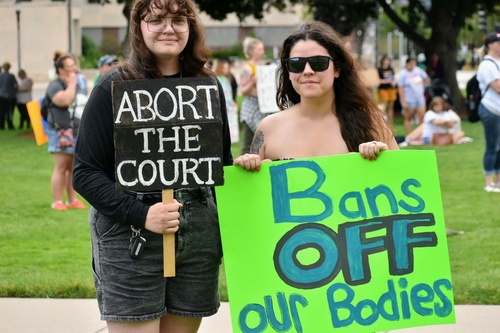Rick Haglund: Whitmer says ‘bigotry is bad for business.’ Is it true?

It was a clever phrase designed to grab headlines, and it did.
“Bigotry is bad for business,” Gov. Gretchen Whitmer said in her January State of the State speech, imploring lawmakers to add anti-discrimination protections based on gender identity and sexual orientation to the state’s civil rights law.
They ultimately obliged and Whitmer signed the landmark legislation adding protections for LGBTQ+ Michiganders to the state’s 1976 Elliott-Larsen Civil Rights Act earlier this month.
Whitmer plans to utilize the law and Michigan’s new constitutional protection for abortion as an economic development tool to attract new business investment and workers. She is also expected to sign recently passed bills that would overturn a 1931 law prohibiting abortion in the state.
“Protecting these freedoms is the right thing to do and it’s just good economics,” Whitmer said. “States with extreme laws are losing talent and investment because bigotry is bad for business. We should build on our reputation as a welcoming beacon of opportunity where anyone can succeed.”
The governor said she’ll “go to any state that restricts people’s freedoms and win business and hardworking people from them. I’m looking at you, Ohio and Indiana.”
Ohio has one of the most restrictive abortions bans in the country. Indiana, which also severely restricts abortion, is considering adopting a “Don’t Say Gay” law similar to a controversial one in Florida.
Whitmer’s message was endorsed by chambers of commerce and business lobbying organizations across the state that for years have voiced support for adding LGBTQ+ protections to the state’s civil rights law.

“This is a business issue,” a coalition of business groups wrote to the Legislature in January. “More and more individuals seek communities and states that value diversity and inclusion.”
But do they? Employment data and recent high-profile business investment decisions challenge that assumption.
Some states that have enacted, or are attempting to enact, some of the most restrictive laws on abortion and LGBTQ+ rights also are top job producers.
Texas, which prohibits nearly all abortions, recorded the largest jump in job growth among big-population states in the country last year at 5%, according to Bureau of Labor Statistics data.
Right behind the Longhorn State was Florida, where Gov. Ron DeSantis is banning books, demonizing LGBTQ+ people and attacking universities and corporations for their diversity, equity and inclusion policies.
Michigan was among the lowest tier of states with job growth of 2.3% between January 2022 and January 2023.
States with restrictive abortion laws and unfriendly policies toward LGBTQ+ people are also raking in business investment.
Kansas, which has introduced a slew of anti-LBTQ+ legislation, had more capital investment projects per capita last year than any other state, according to a new report by Site Selection magazine.
Kentucky, where the state Legislature recently passed what the American Civil Liberties Union called the worst anti-trans bill in the country, ranked second.
Site Selection listed only the top 10 states for investment projects and Michigan was not among them. Ohio and Indiana, states Whitmer is targeting for investment, ranked third and eighth, respectively, for investment projects per capita.
Texas was home to the most business investment projects overall.
But these data points tell an incomplete story. The federal jobs data, for instance, doesn’t break down new jobs by pay and educational attainment. And businesses choose where to invest using many factors, including available workforce, infrastructure, quality of life and cost of doing business.
Whitmer and the Legislature are working to check those boxes with lucrative college scholarships, more investment in local communities and schools, and a huge business location incentive fund, among other initiatives.

Tim Bartik, senior economist at the Upjohn Institute for Employment Research in Kalamazoo, told me it’s “simply too early” to tell whether the Supreme Court’s 2022 Dobbs decision, ending the constitutional right to abortion, and new legislation in other states taking aim at LGBTQ+ people will result in more workers moving to states like Michigan that protect abortion and LGBTQ+ rights.
If Michigan were to benefit from such relocations, Bartik said those coming here would likely be more mobile college graduates that the state is trying to attract, particularly households with women of childbearing age.
A survey last year found the large cities college students want to live in after they graduate are those located mostly in blue states that offer more protections for abortion and the rights of LGBTQ+ people. Among them were Seattle, Denver, Chicago and Minneapolis. Detroit didn’t make the cut.
But Michigan is starting to gain some national publicity as a safe spot for women of child-bearing age and the LGBTQ+ community. The Huffington Post recently called Michigan “the anti-Florida,” in part because of the addition of sexual orientation and gender identity to its civil rights law protections.
Michigan has taken important steps to make the state welcoming for all. Now it’s up to business leaders to show with their investment and job creation decisions that bigotry really is bad for business.








